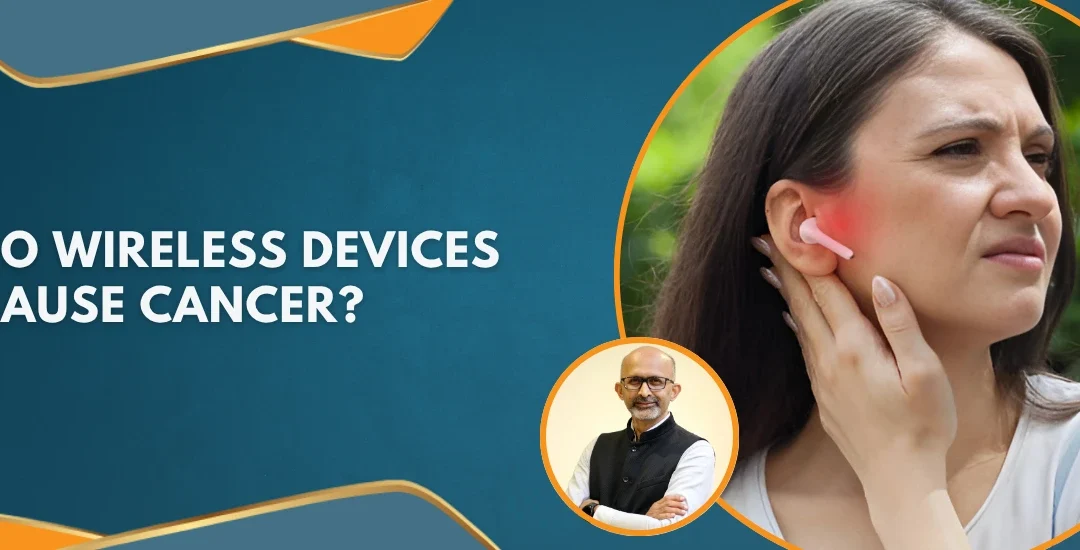The idea that wireless devices cause cancer is a popular one, with many people believing that the risk of cancer is being increased because of the number of devices that we have in our lives. However, scientists have found no evidence to support this. The World Health Organization released a statement saying that there is no conclusive evidence to link cancer and EMFs from wireless devices.
Dr. Sandeep Nayak is one of the leading oncologist in Bangalore. You can consult with him if you are facing some health discomfort through your wireless devices. He can guide you with all the treatments regarding this.
What is the specific exposure to EMFs(Electric and magnetic fields)?
 There are many possible sources of electromagnetic fields, including talking on a mobile phone while driving, using a cordless phone in the home or office, and sleeping near a baby monitor. A large number of studies have been done to try and measure the different types of EMFs, but so far there is no definite connection between them and cancer.
There are many possible sources of electromagnetic fields, including talking on a mobile phone while driving, using a cordless phone in the home or office, and sleeping near a baby monitor. A large number of studies have been done to try and measure the different types of EMFs, but so far there is no definite connection between them and cancer.
What are the effects of exposure to EMFs?
The risks of EMF are still being debated. On one side, some people think that the risk is too high for people to be exposed to EMFs without warning labels or any restrictions on use. Other people believe that EMF can’t cause cancer because the energy is too weak and there’s not enough evidence of it causing cancer.
Symptoms of EMF exposure.

The precise and accurate impacts of EMF exposure on human health have yet to be discovered. In the coming years, research may provide us with more information.
Some studies link EMF exposure to a variety of ailments, although researchers agree that additional research is needed. Many of the studies rely on animal or cell models, which are unreliable when used in human health research.
Some of these symptoms have also been linked to electromagnetic hypersensitivity (EHS), a condition in which people attribute a variety of non-specific symptoms to EMF exposure.
Although people do experience symptoms that are sometimes uncomfortable and even disabling, the medical field has not confirmed EHS.
There is currently no reputable evidence linking EHS symptoms to EMF exposure, and EHS is not considered a medical diagnosis. More research, according to the medical community, is required.
Nonetheless, some evidence suggests that EMF symptomatology may be true. Some researchers have suggested the following symptoms:
- You can experience sleep disturbance or you can also have insomnia.
- Mild or excessive headaches
- You can grow depressive symptoms or can get depression.
- Fatigue or tiredness.
- Dysesthesia is often an itchy sensation or sometimes painful.
- You can get a lack of concentration.
- Loss of appetite or weight loss.
- Dizziness.
If you are getting any of this symptoms you can consult with Dr. Sandeep Nayak who is one of the renowned and best cancer specialists in Bangalore. With his years of expertise in oncology he can give you the best guidance with the treatment.
How do wireless devices cause cancer?
Although a lot of studies have been conducted, there is still no conclusive evidence that says that wireless devices cause cancer. However, the majority of the studies were done with animals and not humans. The International Agency for Research on Cancer (IARC) has warned about the dangers of these devices in regards to long-term exposure.
What you can do to limit exposure and protect yourself and your family
It is still too early to know for sure. There is no strong evidence that wireless devices cause cancer, but it’s important to take precautions until we have a better understanding of the potential effects of radiofrequency energy. The most important thing you can do to limit your exposure and protect yourself and your family is to reduce the time spent using a device before going on to the next one. It’s also a good idea not to carry your phone in your pocket or near your body if it’s sending or receiving data from the network.
Conclusion
There is no conclusive evidence that wireless devices cause cancer and some studies have yielded opposite results. Hopefully, in the future, we will have more information on whether or not WiFi emits harmful levels of EMF radiation.


